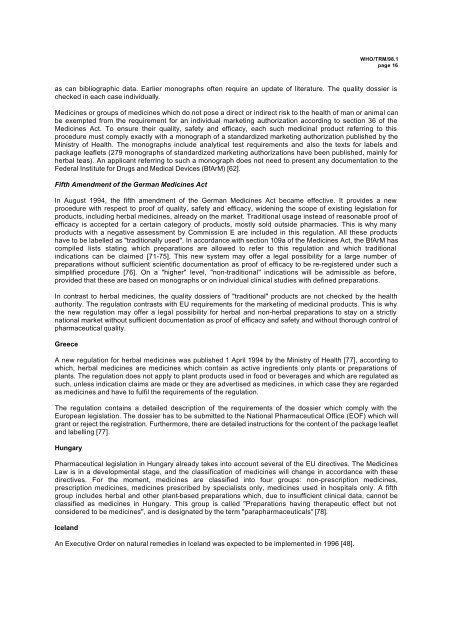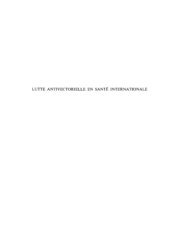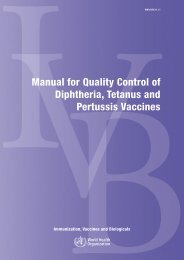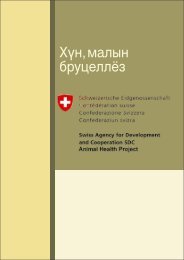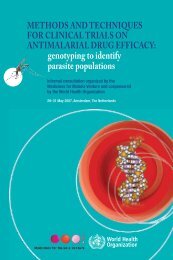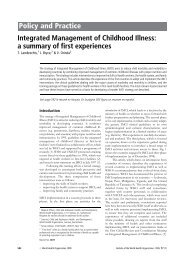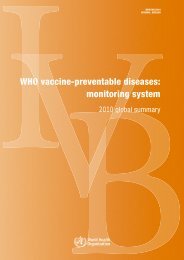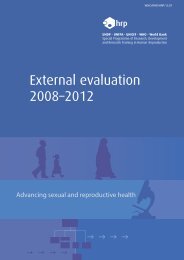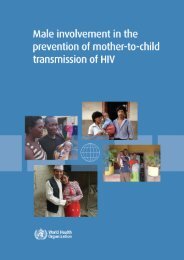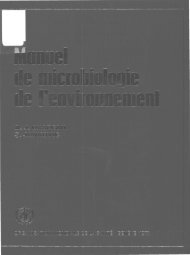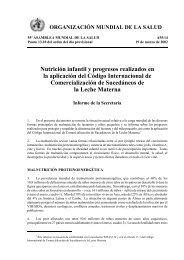WHO/TRM/98.1page 16as can bibliographic data. Earlier monographs <strong>of</strong>ten require an update <strong>of</strong> literature. The quality dossier ischecked in each case individually.<strong>Medicines</strong> or groups <strong>of</strong> medicines which do not pose a direct or indirect risk to the health <strong>of</strong> man or animal canbe exempted from the requirement for an individual marketing authorization according to section 36 <strong>of</strong> the<strong>Medicines</strong> Act. To ensure their quality, safety and efficacy, each such medicinal product referring to thisprocedure must comply exactly with a monograph <strong>of</strong> a standardized marketing authorization published by theMinistry <strong>of</strong> Health. The monographs include analytical test requirements and also the texts for labels andpackage leaflets (279 monographs <strong>of</strong> standardized marketing authorizations have been published, mainly forherbal teas). An applicant referring to such a monograph does not need to present any documentation to theFederal Institute for Drugs and Medical Devices (BfArM) [62].Fifth Amendment <strong>of</strong> the German <strong>Medicines</strong> ActIn August 1994, the fifth amendment <strong>of</strong> the German <strong>Medicines</strong> Act became effective. It provides a newprocedure with respect to pro<strong>of</strong> <strong>of</strong> quality, safety and efficacy, widening the scope <strong>of</strong> existing legislation forproducts, including herbal medicines, already on the market. Traditional usage instead <strong>of</strong> reasonable pro<strong>of</strong> <strong>of</strong>efficacy is accepted for a certain category <strong>of</strong> products, mostly sold outside pharmacies. This is why manyproducts with a negative assessment by Commission E are included in this regulation. All these productshave to be labelled as "traditionally used". In accordance with section 109a <strong>of</strong> the <strong>Medicines</strong> Act, the BfArM hascompiled lists stating which preparations are allowed to refer to this regulation and which traditionalindications can be claimed [71-75]. This new system may <strong>of</strong>fer a legal possibility for a large number <strong>of</strong>preparations without sufficient scientific documentation as pro<strong>of</strong> <strong>of</strong> efficacy to be re-registered under such asimplified procedure [76]. On a "higher" level, "non-traditional" indications will be admissible as before,provided that these are based on monographs or on individual clinical studies with defined preparations.In contrast to herbal medicines, the quality dossiers <strong>of</strong> "traditional" products are not checked by the healthauthority. The regulation contrasts with EU requirements for the marketing <strong>of</strong> medicinal products. This is whythe new regulation may <strong>of</strong>fer a legal possibility for herbal and non-herbal preparations to stay on a strictlynational market without sufficient documentation as pro<strong>of</strong> <strong>of</strong> efficacy and safety and without thorough control <strong>of</strong>pharmaceutical quality.GreeceA new regulation for herbal medicines was published 1 April 1994 by the Ministry <strong>of</strong> Health [77], according towhich, herbal medicines are medicines which contain as active ingredients only plants or preparations <strong>of</strong>plants. The regulation does not apply to plant products used in food or beverages and which are regulated assuch, unless indication claims are made or they are advertised as medicines, in which case they are regardedas medicines and have to fulfil the requirements <strong>of</strong> the regulation.The regulation contains a detailed description <strong>of</strong> the requirements <strong>of</strong> the dossier which comply with theEuropean legislation. The dossier has to be submitted to the National Pharmaceutical Office (EOF) which willgrant or reject the registration. Furthermore, there are detailed instructions for the content <strong>of</strong> the package leafletand labelling [77].HungaryPharmaceutical legislation in Hungary already takes into account several <strong>of</strong> the EU directives. The <strong>Medicines</strong>Law is in a developmental stage, and the classification <strong>of</strong> medicines will change in accordance with thesedirectives. For the moment, medicines are classified into four groups: non-prescription medicines,prescription medicines, medicines prescribed by specialists only, medicines used in hospitals only. A fifthgroup includes herbal and other plant-based preparations which, due to insufficient clinical data, cannot beclassified as medicines in Hungary. This group is called "Preparations having therapeutic effect but notconsidered to be medicines", and is designated by the term "parapharmaceuticals" [78].IcelandAn Executive Order on natural remedies in Iceland was expected to be implemented in 1996 [48].
WHO/TRM/98.1page 17IrelandThe Medical Preparations (Licensing, Advertisement and Sale) Regulations 1984 provide a common statutorylicensing system for all medicines, both proprietary and non-proprietary, taking into account the respectiveEuropean directives. In general, a product authorization is required for a medical preparation to be imported orplaced on the Irish market [79].In August 1985, "Guidelines for Application for Product Authorization <strong>of</strong> <strong>Herbal</strong> Products" were issued by theNational Drugs Advisory Board (replaced by the Irish <strong>Medicines</strong> Board in 1996) giving information on therequirements for their assessment [80]. These guidelines contain detailed requirements for the plant rawmaterial and also for finished products, but have been largely superseded by the European note for guidance,particularly in relation to the quality <strong>of</strong> herbal remedies. Safety and efficacy requirements are consistent withthose required for conventional pharmaceutical products. Experimental animal studies have to be undertakento delineate the effects <strong>of</strong> the contained substances and <strong>of</strong> the medicinal product. Where possible,comparative studies should be made with a pure drug substance having a similar effect. The tests shouldgenerally include examinations in rodents as well as in humans. In the case <strong>of</strong> a drug substance which islikely to be used in association with other drugs, account should be taken <strong>of</strong> the potential for interaction interms <strong>of</strong> the therapeutic effects, side effects and toxicity <strong>of</strong> each drug substance concerned. Each activeingredient should make a relevant and reasonable contribution to the overall therapy, and the quantity <strong>of</strong> eachactive ingredient must be effective, safe and appropriate to the recommended use and range <strong>of</strong> dosage.Detailed requirements for tests <strong>of</strong> acute and chronic toxicity have to be fulfilled, e.g., a test for acute toxicity in atleast three mammalian species, and a detailed list <strong>of</strong> requirements for the tests <strong>of</strong> chronic toxicity [80].Until the end <strong>of</strong> 1995, it had not been possible to identify a simplified procedure for dealing with assessment<strong>of</strong> such products based upon the waiving <strong>of</strong> any requirement for efficacy and/or safety. It was hoped to addressthis as part <strong>of</strong> the remit <strong>of</strong> the Irish <strong>Medicines</strong> Board in 1996 [81].An information sheet on Borderline Products was issued by the Department <strong>of</strong> Health in 1988 [79] attemptingto explain the position <strong>of</strong> these products under the regulations. Products containing herbal ingredients areconsidered to be medical preparations under the regulations when the labelling or accompanying orassociated literature makes any preventive, curative or remedial claim, or any <strong>of</strong> the herbal ingredients presentis recognized as having medicinal properties. An illustrative list <strong>of</strong> such herbs is included as an annex listingabout 100 herbs with these properties. Preparations consisting <strong>of</strong> dried, crushed or comminuted herbslabelled in a manner which specifies the herb and the process <strong>of</strong> production are excluded from the scope <strong>of</strong>the regulations provided no other name is given to the preparation and no recommendation as to use as amedicinal preparation is made. Examples <strong>of</strong> such exempted products would include Senna leaves, Sennapods and Carrageen moss [79]. The information memorandum on borderline products issued by theDepartment <strong>of</strong> Health in 1988 was updated in 1990. However, principles alluded to in the 1988 documentremain valid [81].In December 1993, the Food Safety Advisory Committee prepared a Report on Food Supplements and HealthFoods to the Minister for Health and the Minister for Agriculture, Food and Forestry [82]. The report addressesthe question <strong>of</strong> an appropriate policy for the control <strong>of</strong> products which are on the borderline between foods andmedicines, including natural materials the composition and status <strong>of</strong> which may have not been established,such as herbal extracts, herbal teas, essential oils. These products should be subject to authorization by theregulatory authority prior to marketing. Reference is made to the memorandum <strong>of</strong> the Department <strong>of</strong> Health onBorderline Products [79]. With respect to herbal teas, a regulatory framework is recommended to ensure thatno potentially toxic plants are marketed as herbal teas, that all the plant materials comply with stringent qualitystandards, and that problems <strong>of</strong> environmental contamination <strong>of</strong> herbal materials (e.g., the need for statutorycontrols on levels <strong>of</strong> pesticides, heavy metals and radionuclides in teas) are taken into account. Wheremedicinal benefits are claimed or imaginative labelling suggests such benefit for herbal teas, they should beregarded as medicines and therefore regulated by the National Drugs Advisory Board (replaced by the Irish<strong>Medicines</strong> Board in 1996). Materials for use as herbal teas should not be permitted by the appropriateregulatory authority unless they have GRAS (generally recognized as safe) status, or are recommended asacceptable for inclusion in food by the Council <strong>of</strong> Europe, or have been approved for food use by anotherauthoritative body. Quality control should be guaranteed in accordance with the European Pharmacopoeia.With respect to essential oils, it is recommended that they should not be permitted unless they have beenapproved for use as flavouring substances and natural sources <strong>of</strong> flavourings by the Council <strong>of</strong> Europe, havebeen granted GRAS status, or have been accepted for food use by other authorities. Furthermore, it isrecommended that the regulatory authority draw up a list <strong>of</strong> herbal substances which are toxic under normalconditions <strong>of</strong> use. All products included in this category <strong>of</strong> natural materials, the composition and status <strong>of</strong>which may not have been established and which are marketed for their health giving properties such as herbal


